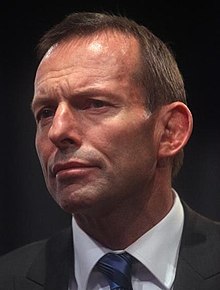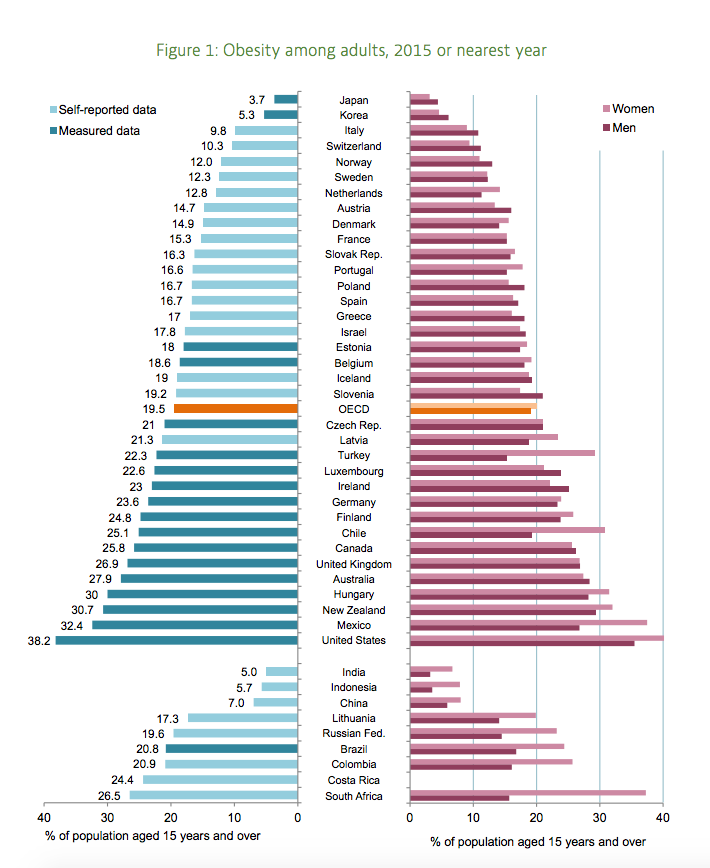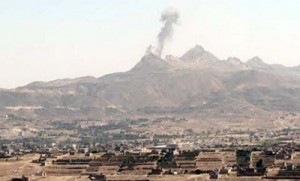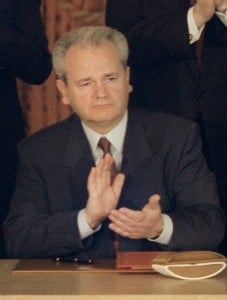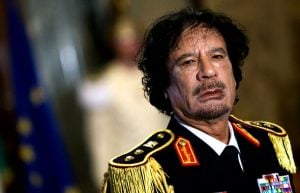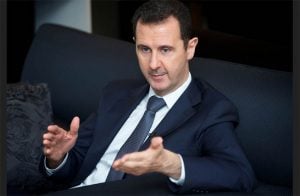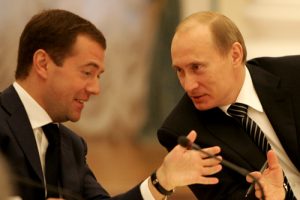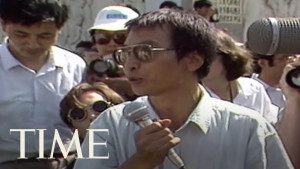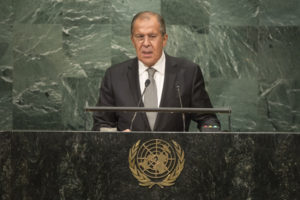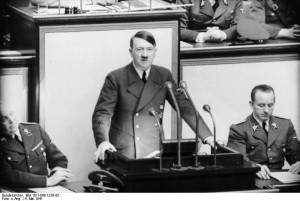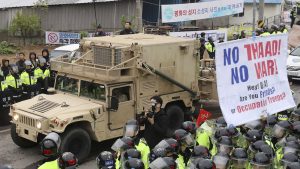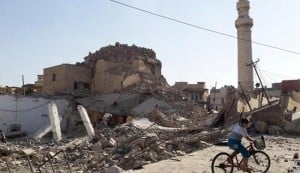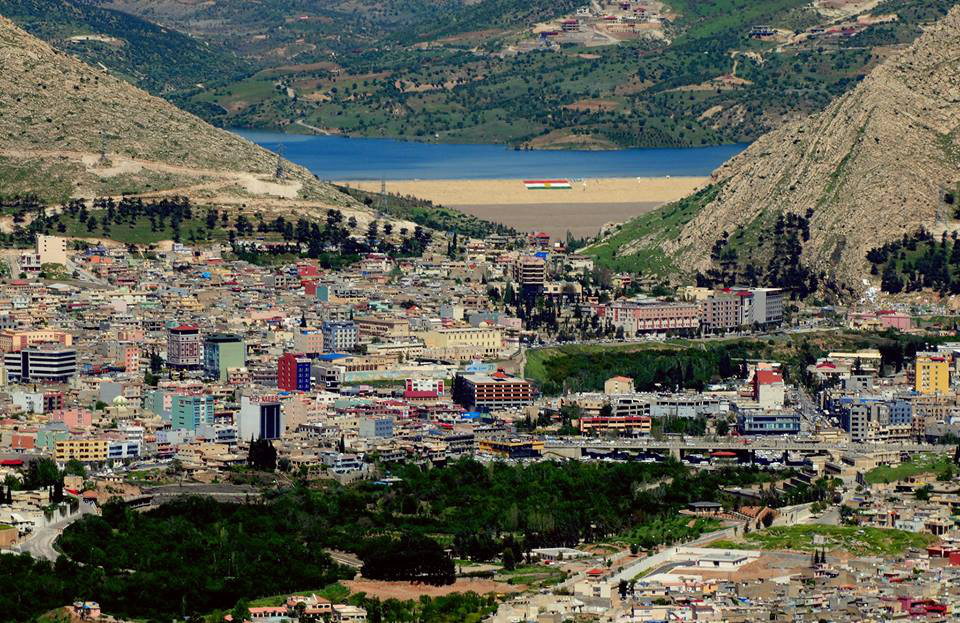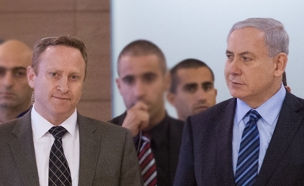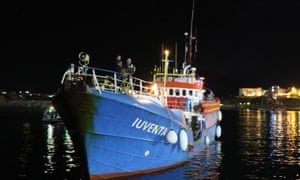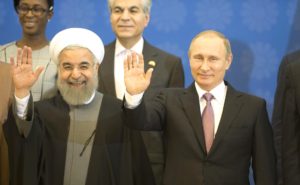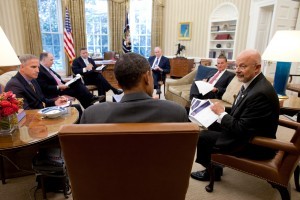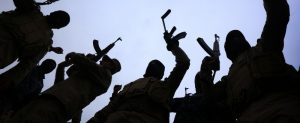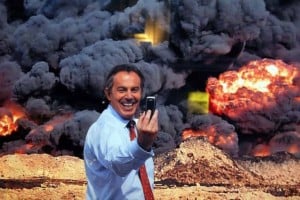The Russian Revolution of 1917 terrified the capitalist world. In my last article based on the first volume of D.F. Fleming’s classic “The Cold War and It’s Origins 1917-1960” I traced the story of the attempt to destroy the world’s first communist revolution.
14 Nations attacked the Soviet Union attempting to carve out territory and crush the revolution. They also launched a massive wave of repression at home.
Then they attempted to isolate the USSR while they built up Hitler’s Germany as a bulwark against Communism. This lead to World War 2 and an alliance between the USSR, Britain and the US.
The Soviet Union managed to almost singlehandedly defeat Nazi Germany. However before World War 2 had even ended “the cold war” had already begun with the British allying with fascists in Greece to crush the Communist lead partisans in late 1944.
And America allying with Japan to crush the Hyuk Resistance in the Philippines. During the war Winston Churchill and Joseph Stalin made a deal carving Europe into spheres of influence. Greece was in the British sphere of influence it was key to their control of the mediterranean. Thus the Soviets did nothing to aid their Greek comrades while the British waged a brutal war on the country. In exchange the Soviets were granted most of eastern Europe. This deal was formalized at Yalta in the Crimea during the war in a meeting with Franklin Roosevelt, Churchill, and Stalin. The United States wanted to bring Russia into the war against Japan and the Soviets already controlled eastern Europe which they had liberated from the Nazis.
From Roosevelt to Truman
However Roosevelt died and his new Vice President Truman who had replaced the more pro-soviet Henry Wallace at a rigged convention the year before became president. The day after the Nazis had invaded the Soviet Union back in 1941 Senator Truman had declared “If we see that Germany is winning we ought to help Russia, and if Russia is winning we ought to help Germany, and that way let them kill as many as possible. He quickly abandoned Roosevelt’s efforts to maintain friendly relations with the Soviets. Instead Truman and his hawkish advisers decided to attempt to destroy the Soviet Union which had suffered huge losses during the war with 27 million dead and thousands of factories, villages, farms, hospitals and schools destroyed.
The United States was largely undamaged, had the worlds largest economy and had developed the atomic bomb. They hoped to force the Soviet Union to abandon control of Eastern Europe and to eventually destabilize and destroy the USSR itself. Thus a massive propaganda scare campaign was launched attempting to convince the world that the Soviet Union was out to conquer the world. This propaganda campaign completely turned reality on it’s head. The soviets wanted only to rebuild their country not plunge themselves into another war especially since the United States had the Atomic bomb and they didn’t.
At the same time the Soviets were being falsely branded aggressors they were actually the victims of a covert war waged by the west using Ukrainian SS veterans and other fascists managed by British and American Intel through their German proxy Reinhard Gehlen.
In Ukraine, Estonia, Latvia, Lithuania, Poland, Albania and other countries the west would wage a secret war against the soviets largely unknown to this day. Another red scare was launched on the home front crushing dissent against this aggressive policy and purging Communists both real and imagined from the government, labor unions academia, and the media. Anyone questioning this propaganda campaign anyone working for peace, or for an end to America’s “Jim Crow” apartheid system, anyone trying to improve the lives of everyday Americans was likely to be labeled a communist and blacklisted. Fascist war criminals and collaborators on the other hand had their records whitewashed and received prominent positions in the government, the churches, the media, corporations. They were hailed as freedom fighters by the media.
The Nuclear Threat against the Soviet Union
The Soviet Union was under constant threat of nuclear attack and were also targeted with covert and psychological warfare. They countered these dangers by tightening their control over Eastern Europe to guard against these destabilization schemes by what would become the CIA and the OPC which later merged.
This tightening of control was portrayed in the media as if it were an invasion the steady march of communism across Europe ignoring the fact that they already controlled these countries as a result of their victories during World War 2. Even today this cold war propaganda is parroted as if it was history. One has to read a book like D.F. Fleming’s to learn the actual story.
At the same time the Soviet Union was frantically working on developing nuclear weapons of it’s own. The west was shocked in 1949 when the USSR finally succeeded in building it’s own nuclear weapon.
Now it was not merely the Soviet Union that faced destruction but potentially the world. America and Britain’s aggressive policies had brought the world to the brink of nuclear war where it remains today. Ironically America was so arrogant that it had refused to share their nuclear secrets with even their close allies Canada and Britain whose help had been invaluable in the creation of the atomic bomb. Britain which was so instrumental in starting the cold war was forced to develop the bomb on it’s own playing catch up to the Russians.

Clement Attlee, Harry S. Truman and Joseph Stalin at the Potsdam Conference, 1945. (Source: Wikimedia Commons)
The Truman Doctrine
The Truman Doctrine pledged not only to encircle and destroy the Soviet Bloc but to prevent revolution anywhere in the world. Thus what is commonly called the “Cold War” quickly evolved into what I prefer to call World War 3 a war on the entire third world. For centuries the countries of Western Europe had conquered the world turning the entire planet into colonies and semi-colonies and killing hundreds of millions of people in the process.
Their imperial rivalries had lead them into World War 1 and they had been forced to bring in recruits from through out their empires to help them fight. Now in 1945 exhausted after two World Wars and having unleashed nationalist forces around the world their empires were on the verge of collapse. Truman had basically pledged to wage war on the entire planet to prevent this inevitable process from occurring.
Africa and Asian countries had already begun to fight for their independence and the United States was now on the side of colonialism and counter-revolution around the world. The Philippines, China, Korea, Vietnam, Algeria, would be the scene of incredibly bloody and brutal wars aiming to either preserve old empires or bring them into the newer American empire. It would be an empire of bases, an empire of corporations and an empire of US imposed military dictatorships. It would stretch across the world from Latin America long under US domination to Africa and Asia. The US allied with the fascists of Italy, Germany, Japan, plus fascist exiles from places like Croatia, Ukraine, Hungary, and Romania. At the same time the former imperial powers of western Europe like Spain, Portugal, the Netherlands, Belgium, France, and Britain quickly became little more then pawns of the Americans, terrified that their insane new American masters would embroil them in a Nuclear War.
China
D.F. Fleming begins his second volume with an event equally shocking to the explosion of the Soviet “A-bomb” to the west that occurred that same year of 1949. This was the victory of the Chinese Revolution which meant the liberation of China after more then a century of foreign domination. The empires of Europe the British, the French, the Germans, and Russians along with the Americans and Japanese had all invaded China at will carving out spheres of influence and demanding humiliating concessions. China once the richest and most powerful nation on the earth had become poor and helpless under the brutal imperialists.
Of course the full history of China’s revolution is too complicated to fully explain in a short article although Fleming does a masterful job of trying to condense the story into a single chapter. He traces the origins of the Chinese revolution back to the 1851 Taiping rebellion, through the fall of the Ming dynasty and the declaration of a Chinese republic which was still under foreign domination and which quickly broke down into warlordism. It was World War 1 that was to prove a pivotal event fueling economic growth and modernization in China.
World War 1 lead to the Russian Revolution and many around the world especially in China were inspired by this event. The soviets declared their opposition to Colonialism and Imperialism Lenin and Stalin realized that in the wake of World War 1 the western empires hold on the rest of the world would begin to slip. Faced from hostility from the west they turned to the global south both to make new allies and to cause trouble for their enemies. As a friendly gesture to the Chinese they renounced their Russian empires holdings in China. The Chinese nationalists the KMT formed an alliance with Russia and with the Chinese communist party.
Up until 1927 this alliance was a success the tiny Chinese communist party grew rapidly and increasingly became independent of their soviet advisers. It is a lesson all successful revolutionaries must learn they cannot simply imitate the last revolution but must adapt what they learn to entirely different conditions. Of course this is what makes one of the most beloved myths of the cold war so absurd Revolutions could not be directed from Moscow because to be successful they had to be locally directed only the Chinese understood China.
This lesson was brought home in 1927 when the KMT grew frightened of the rise of communist influence. The KMT base of support were the landowners and big Chinese capitalists. The communists were organizing labor unions and undertaking land reforms. Chiang Kai-Shek the head of the KMT who had Ironically trained in the Soviet Union decided to make an alliance with the British, the French and the Americans against both the Chinese communists and the Russians. The Russians had tried to prevent a break and this only contributed to the coming disaster. Chiang’s forces were marching to take Shanghai the people were mobilized by the communists to support his advance with strikes and protests. Chiang deliberately delayed his advance so they could be crushed then when he finally arrived he used his KMT forces in alliance with drug dealing gangsters to massacre the communists.
This was the start of the Chinese civil war. It was also the start of the massive heroin empire the KMT would use to get rich, buy weapons, wage war, and buy American politicians eventually bringing them into alliance with the CIA. It discredited those Chinese communists close to Moscow and led to the rise of Mao Tse Tung who began his long march to escape the KMT. Under the able leadership of Mao Tse-Tung the PLA (People’s Liberation Army) concentrated their efforts on winning control of the countryside.
The Chinese peasants lived under even worse conditions then the Russians. Landlords had total control over their lives and they were virtual slaves kept in ever growing debt. They could not even marry without the landlords permission and their wives and daughters were forced to endure their landlords lusts without complaint. Hunger, disease and ignorance reigned. The Chinese communists brought land reform and the rule of law winning them the love of the people. The KMT on the other hand made themselves hated wherever they seized control with their corruption and cruelty. In addition to this Civil War China was soon to face a new threat as the Japanese set out to conquer China. However the KMT viewed the Communists as the real danger further discrediting themselves in the eyes of the Chinese people.
China was hugely important to a large sector of Americans. As Europe’s power declined these Americans believed that all of China would soon fall under their control. Many future top level OSS and CIA officers had been recruited out of the families of American missionaries who had served in China. American Gangsters also had close ties to the KMT who supplied America’s heroin. Many west coast businessmen relied on the China trade. There were also media figures like Edward Luce owner of Time and Life Magazines.
These forces would coalesce into the “China Lobby” and overlapped strongly with those Americans allied to the fascists. They strongly backed the KMT which began to receive huge amounts of money and weapons from the US. Claire Chennault would supply the KMT with a private air force the AVG which would evolve into CAT and later Air America both infamous for their role in heroin smuggling.
This aid would escalate once America was at war with Japan as well after Pearl Harbor on December 7 1941. However the KMT remained determined to avoid fighting the Japanese and concentrated on trying to destroy the Communists. Their American adviser General Stillwell got so fed up he tried to arm the communists and force reforms on the KMT but instead he was fired. The Communist Guerrillas on the other hand fought constantly to liberate their country. They fought with arms captured from the KMT and the Japanese. The role of these Chinese communists in waging a massive Guerrilla warfare campaign against the Japanese is even more completely ignored by most histories then the Russian Role in winning World War 2. Also forgotten is the massive suffering and murder that imperial Japan unleashed in China killing at least 20 million people.
Most infamous was the Rape of Nanking in which a whole city was systematically raped, looted and slaughtered hundreds of thousands dying in a manner of days. The KMT made a secret deal with the Japanese during the war and many openly joined the Japanese side. The deal was to protect the Japanese war criminals and the Chinese traitors after the war.
The people of China had a choice between the KMT corrupt, brutal, and treacherous or the communists who promised land reform and who had heroically resisted the Japanese. When the war ended in part due to the Red Army’s crushing defeat of the Japanese in Manchuria America hoped it could by supporting the KMT achieve their dream of gaining control of China. Of course as usual they were completely ignoring the will of the Chinese people who for obvious reasons preferred the communists and certainly had no desire to become America’s colony under General Chiang Kai-Shek.
Still the US did everything it could to prop up Chiang and his KMT. They flooded the country with money, but the KMT stole most of it since they were already planning their exile. They flooded the KMT with weapons but the KMT sold them to the guerrillas to make cash. The Americans had 100,000 troops and a huge air force it used to try to help the KMT seize control of communist held areas but the Communists fought on. The American troops began to complain about being stuck in the middle of a Chinese civil war long after World War 2 had ended. When the KMT forces began to collapse in the face of a long series of communist advances the Americans and the KMT were forced to flee the country. Mao was victorious and the American empire and the China Lobby were in a state of rage.
They demanded to know how China could be “lost” and decided it could only be explained by communist treachery within the government. For decades they would foolishly attempt to take back China nearly embroiling the US in a nuclear war on several occasions. In the media it was implied that somehow the Russians had managed to conquer China rather then admit to the painful truth that America had failed to conquer it. Of course even if the U.S. had poured all of it’s resources into trying to hold China it would probably have brought a catastrophic defeat upon itself as the war in Vietnam would later prove given China’s much greater size and population one can imagine how much more disastrous this attempt would have been. For decades they would refuse to recognize China instead claiming that the island of Formosa was the “real China” a former Japanese Colony that the KMT had brutally conquered with a Massacre in 1947 after it’s people rebelled against their corrupt rule. Formosa would become known as Taiwan and the United States is still willing to wage a nuclear war to keep China from taking back it’s island.
The Korean War
The “loss” of China would lead the next year to a massive escalation of the war in Korea. Most people believe that the Korean War began in 1950 when North Korea invaded South Korea. This is another example of cold war propaganda becoming enshrined in mainstream history. In reality South Korea (spurred on by the Dulles brothers, General Macarthur and the China Lobby) probably attacked North Korea in 1950 provoking a North Korean counter attack. South Korea had been launching military offensives against North Korea aimed at seizing a foothold and also sending small bands of terrorists to wreak havoc.
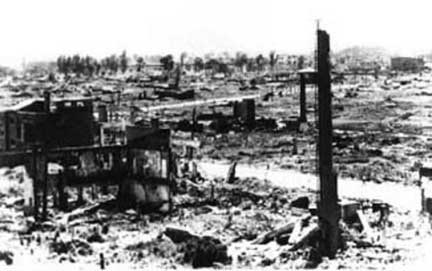
Pyongyang in Rubble (1953)
More importantly however the Korean War actually began in 1945 when the Americans were permitted to occupy the Southern Half of the country. For a thousand years Korea had been a unified and independent country until it was conquered by Japan and used as a springboard for the invasion of China. Koreans like Kim Il Sung had gone to join the Chinese Guerrillas fighting the Japanese. Others stayed in Korea and fought the Japanese occupiers. Others choose to serve the Japanese fighting in their army and forming a Japanese run police force. However by the time the Americans arrived Korea was unified and liberated.
It was ruled by people’s committee’s combing nationalists and Communists. America decided to crush these people’s committees and put those Koreans who had collaborated with the Japanese in charge. They brought in Syngman Rhee who had lived in exile in the US for 20 years and installed him as a dictator. They cancelled plans to reunify the country. To suppress the people’s committees they unleashed a brutal counterinsurgency war on the South Koreans. Long before 1950 they turned south Korea into a massive war zone as peasants often armed with nothing more then bamboo spears tried to resist this illegal occupation of their country.
Even South Korean troops began to join the rebellion sick of being used to slaughter their own people. Thus the Korean War began long before North Korea counterattacked and Rhee’s unpopularity and the poor morale of the troops explains why the South Korean Army nearly collapsed making a panicked retreat south when the North Koreans entered the war. This effort by the North Koreans to liberate and reunify their country has absurdly been termed an invasion. The invaders were the Americans.
In North Korea on the other hand the Russians allowed the people’s committees to remain in power and the war hero Kim Il Sung became the leader. He was fiercely independent and the Russians maintained a hands off policy until withdrawing their troops. Contrary to myth the Soviets were caught completely by surprise at the start of the Korean War and did not order “the invasion” as the American press pretended to believe and as historians continue to repeat. They had supplied no extra weapons to the DPRK and were boycotting the UN when the war began over it’s failure to recognize China.
Instead like I.F. Stone before him (who Fleming admired) Fleming sees the war as a product of a scheme by Rhee,MacArthur, John Foster Dulles, and Chiang Kai-Shek to provoke a war in order to save both Rhee and Chiang’s tottering regime. John Foster Dulles (brother of future CIA director Allen Dulles) who would later become Secretary of State under Eisenhower is the major villain in Fleming’s second volume with his insane brinksmanship nearly leading the world into Nuclear war time and again.
MacArthur like Dulles was a central figure in American fascism. It has since been revealed that if not for the outbreak of the Korean War Chiang would have been toppled by an American backed coup. Rhee had just suffered a humiliating electoral defeat and his people were in open rebellion. By starting the war Rhee brought in 250,000 American troops to his side while Chiang on Formosa was suddenly being protected by the US 7th fleet. Because the Soviets were boycotting the UN the US were able to label North Korea the aggressor and the whole thing was done under UN cover to disguise the imperialist nature of the war in defense of what amounted to an American colony. Most of the troops were Americans along with the British and America’s fascist allies Turkey, Greece, and the Philippines.
The war was one of dramatic reversals first the South Korean forces made a panicked retreat. American troops were transferred in from Japan but they also were soon in a panicked retreat. The North Korean army was tough, disciplined, and highly motivated they pushed the US and Korean forces back towards the southern tip of Korea the “Pusan Perimeter.” However the UN forces were soon flooding into the south and the North Korean advance slowed as their supply lines stretched out. America controlled the sea and the air they were able to bomb the North Koreans at will and bombed the South Koreans for good measure.
They massacred refugees fleeing south since they worried some of them might be communists. The Americans continued their war on the South Koreans throughout the war and in reality it continues to this day. Using their Naval superiority MacArthur staged a landing at the Port of Inchon leveling the city and unleashing Rhees troops and fascist death squads on the survivors. The North Korean army was forced to retreat or risk being cut off. Now the UN forces decided to invade North Korea and reunify the whole country under Rhee’s dictatorship. They advanced steadily but the North Korean forces were actually regrouping far to the North as well as setting up a guerrilla army behind UN lines. MacArthur was deliberately attempting to provoke the Chinese he hoped to expand the war into China. He hoped that backed up by a nuclear attack on China Chiang would be able to retake China. He even went so far as to conceal a Chinese counter attack and lie to Truman personally afterwards claiming he believed China would not enter the war when they already had.
Myth has it that Truman fired Macarthur over his reckless desire to use Nuclear weapons. In reality both Truman and later Eisenhower would both threaten to use Nuclear weapons in the war. Instead Macarthur was fired for insubordination and for plotting with Truman’s political rivals. As the UN forces neared the Chinese border the North Koreans resupplied and rested and the Chinese launched a massive counter attack dividing the UN forces. Many of the forces that were believed to be Chinese at the time were actually North Koreans who had been stationed in China so it should be remembered that this was a joint counter-attack. Now they pushed the UN forces back to the 38th parallel and beyond recapturing the capital Seoul for a second time. It was a humiliating defeat for the American empire and a glorious moment for the North Koreans and the Chinese. It was watched with secret joy all over the third world. However through massive airpower and artillery the UN forces managed to halt their advance. The war ground on in a stalemate for a year and a half. The Americans delayed the end of the war in the most cynical manner possible. They claimed that Korean and Chinese prisoners must be given a choice whether they wished to return. Then they tortured the prisoners into saying they wanted to go to Taiwan or remain in South Korea. Eventually the POWS staged a series of massive rebellions and the Americans sent in tanks and artillery to attack them.
The war was incredibly brutal 3 Million Koreans were killed and the US carpet bombed and Napalmed the entire country as well as employing torture and death squads as is their standard practice. They also used Germ Warfare on both North Korea and China. Half a million North Korean Soldiers died in the war. 1 Million Chinese soldiers died defending North Korea. 2 Million North Korean civilians were killed and 1 million South Korean civilians were killed often at the hands of their own or UN forces. 54,000 American soldiers and 47,000 South Korean soldiers died. Only 686 British troops were killed 3,194 UN allies total. Truman became the most unpopular president until George W. Bush.
Vietnam
At the same time as the Korean war the French with massive US assistance were fighting a loosing war in Indochina what is today Vietnam, Laos, and Cambodia. Britain was waging a more successful but equally brutal war in Malaysia at the same time. D.F. Fleming has a wonderful chapter on Vietnam which was still a covert CIA war when the book was published. If only people at the time had paid attention to D.F. Fleming the world would have avoided a genocidal bloodbath for the Vietnamese and a humiliating defeat for the American empire. He describes the history of Vietnam and it’s long struggle for independence against first the French, then the Japanese during World War 2 when they were allied to the US and saved many American airmen.
After the war the US would ally with the Japanese and the French against Vietnam attempting to help France regain control over their colony. The arrogant french colonists began the war as french civilians massacred the Vietnamese in an attempt to “put them in their place”. Soon the French army was bombing and shelling the Vietnamese sections of their cities. The Vietnamese who had been prepared to wait patiently for independence and even maintain friendly relations with France afterwards were thus provoked into immediately beginning their war for independence again. They were tough and well organized under the able leadership of Ho Chi Minh.
They would teach the arrogant french a lesson inflicting a humiliating defeat on the French at Dien Bien Phu. The French had set up a massive base there believing it was impossible to move artillery into the surrounding hills. Through sheer determination using bicycles and their own bodies the Vietminh managed to move in artillery and force the base to surrender. The US paid for this whole french war on the people of Vietnam and even offered to use nuclear weapons to help the french at Dien Bien Phu. D.F. Fleming pleads with his readers not to get involved in a war in Vietnam and debunks the insane “ Domino theory” that argued that if Vietnam were allowed to go communist first Asia and then America itself would inevitably follow ignoring the Pacific Ocean and America’s mighty Navy that it still uses to bully the planet. This domino theory also of course ignores the fact that the Vietnamese only wanted to free their country and had no plans to try to invade and conquer Asia and the United States.
The Domino Theory
The Whole Domino Theory was an absurdity believable only to a brainwashed public raised on decades of anti-communist propaganda on the myth of Communist plans for world conquest. Nonetheless the Americans would manage to embroil themselves in Vietnam violating their Agreements made at Geneva in 1954 which called for elections and reunification the US sent in the CIA to set up yet another pro-American fascist dictator Diem who’s forces they trained to torture and massacre his people igniting a revolution that US troops would attempt to crush themselves in 1964. LBJ sending their military to occupy the country bombing napalming and killing 4 million people, poisoning the land with the chemical weapon agent orange which causes cancer and deformity. They expanded the war into neighboring Laos and Cambodia with disastrous effects. The CIA managed to massively expand the global heroin trade. The US would be defeated in 1975 as South Vietnam collapsed and Vietnam was finally reunified and liberated after almost 90 years of struggle by the heroic people of Vietnam.
That victory still lay far in the future however when Fleming published his book. Instead let us turn our attention to a completely forgotten war that nearly lead to a Nuclear war. The US had used the entry of China into the Korean war to expand their covert war of revenge for “the loss of China.” The CIA used the KMT to wage a proxy war on China just as they would later use Cuban exiles against Cuba, and like they were already using fascist exiles in Europe. The KMT were airlifted into Burma using CAT the CIA/KMT airline starting another infamous chapter in the CIA’s role in the global drug trade. From Burma they launched unsuccessful attacks into China although the KMT were more interested in terrorizing the Burmese and smuggling Heroin. Ironically Burma would later be forced into alliance with China to eject the KMT one of many examples of CIA meddling backfiring as it would in Laos and other places. The CIA also used the KMT in Taiwan to wage war on China using boats and planes to bomb Chinese coastal cities.
When Eisenhower became president John Foster Dulles Secretary of State, and Allen Dulles CIA director they escalated this covert war encouraging the KMT to seize more Chinese islands like Quemoy and Matsu less then 5 miles from China’s shores. They used these islands to attempt to blockade China and launched more attacks. After the end of the Korean War the US came close to Nuclear War over their right to these tiny stolen islands terrifying even US allies like Britain and France. With typical American arrogance they claimed that the islands were vital to America’s national security and of course completely ignored the right of China to it’s own territory as well as it’s right not to constantly be attacked by land sea and air by commandos, ships, and planes.
Nuclear War
Today America is still ready to plunge the world into a Nuclear War in order to prevent China from regaining Taiwan or controlling it’s own waters. Instead the Chinese are constantly menaced by American ships threatening to start a war over the South China Sea. The Quemoy and Matsu crisis were the Cuban Missile crisis of the 1950’s so it is amazing how all memory of it has been erased since. The “China Lobby” nearly destroyed the world. America repeatedly threatened a nuclear first strike and just like today were dying for a chance to test out their tactical nuclear weapons a scheme the Neo-cons revived as part of their plans for a war on Iran during the Bush II years. A war that could also have escalated into a Nuclear war just like the wars in Ukraine and Syria could today.
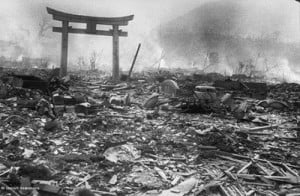
It was this constant tension over Nuclear war that began to discredit the US in the eyes of the world. Back then people still remembered the horror of Hiroshima and Nagasaki and only American politicians and Generals were insane enough to hope for a Nuclear War. Of course they were not quite as crazy as was believed at the time because they had greatly exaggerated the size of the Soviet Nuclear forces and because of their U2 flights knew that they could still destroy the Soviet Union.
However this fact was a closely guarded secret when Fleming wrote his book and even Presidential Candidate John F. Kennedy had no way of knowing that the supposed bomber and missile gaps were complete frauds meant to justify massive military spending. This is also why the Military was so enraged about loosing the chance to start a Nuclear War during the Cuban Missile crisis. What they didn’t know was that the Cuban missiles were installed and fully operational and America would have lost some of it’s cities on the east coast in the process. However for the Nuclear war planners a hundred million dead Americans was a small price to pay for the complete destruction of the Cuba, Soviet Union and China which would have killed 1 billion people in a day.
In the Soviet Union meanwhile Krushchev an incompetent opportunist had risen to power. He would send the Soviet Union on the road to ruin before being overthrown. He reintroduced market forces, shifting focus from heavy industry to consumer goods which while popular in the short term would lead to technological backwardness. Gorbachev would complete what Krushchev started but of course that all lay in the distant future as Fleming wrote.
However the Krushchev years would provide a sort of preview of the collapse when the CIA would take advantage of the chaos caused by his infamous “Secret Speech” attacking Stalin to support a more independent Poland on the model of Yugoslavia. They also attempted to launch a fascist counter-revolution in Hungary which Krushchev was forced to crush after provoking the whole thing with his bungling management of the country. After the Quemoy and Matsu crisis Cold War tensions had relaxed as the world rebelled against the insane Dulles policy of brinksmanship. Hungary would heat things back up and the failed Hungarian proto-color revolution would be used to demonize the soviets for years despite the fact that it was far less bloody then the wars in Greece, Korea, Vietnam, and an ever growing list of countries destroyed to “save” them from communism. The fascist character of the Hungarian Counter-Revolution has been intentionally white washed just as it would later be in Ukraine’s fascist Maidan Coup.
These early cold war years would also see the seeds of the wars in Iraq and Syria planted long ago. This time it was the bungling brinksmanship of John Foster Dulles to blame and yet again a nuclear war was nearly provoked. Dulles goal was to bring the entire world into alliance against the communist bloc. As usual he completely ignored what the people of the world wanted. For most of the world the goal was preserving their newly won independence or in fighting to win it. Thus a non-aligned movement was born at the famous Bandung conference in 1954.
They wanted the right to maintain friendly relations with both sides and included China as a member which enraged the Americans. The CIA tried to assassinate Chou En-Lai the Chinese foreign minister and failed. Instead Chou En-Lai was a huge hit at Bandung and America’s puppets who argued that the NAM (non-aligned movement) should instead focus on “Soviet Imperialism” were completely ignored. They knew full well that it was the so called “free world” France Britain, the Dutch, that had slaughtered and enslaved them not the soviets. The Bandung conference instead condemned Israel to the joy of the Arab world.
Thus by the time of the Suez crisis in 1956 the empire could no longer ignore the forces of national liberation that were sweeping the globe. However for Dulles Neutralism was almost as bad as communism and he continued to attempt to force the world into his anti-communist alliances. In Europe of course there was NATO in Asia SEATO was created. In the middle east their was the Baghdad Pact.
This plan would backfire badly in the middle east where the enemy was seen as Israel a US ally rather then the USSR. By attempting to force Syria and Iraq into becoming American puppets instead Dulles provoked nationalist coups. In Syria this began their alliance with the Soviet Union. Dulles had caused what he hoped to prevent Soviet influence in the middle east. Actually back then the CIA formulated plans for regime change in Syria using the muslim brotherhood. Plans they would try out in the 70’s and 80’s and begin to put into effect again back in 2003 culminating in the 2011 war that continues to this day. Ironically yet again this CIA meddling would produce the opposite result.
Their goal was to eliminate Syria Russia’s only ally in the region and turning the Mediterranean into a NATO lake. Instead they provoked a Russian intervention in Syria massively increasing Russian influence in the region. As for Iraq the CIA hired a young Sadam Hussein to attempt to assassinate Iraq’s new nationalist president Qassem beginning the rise to power of their future ally turned enemy. Both these coups were the result of the US invasion of Lebanon to protect their puppet against his own people an invasion that would be repeated in the 1980’s with disastrous consequences.
However events in Syria and Iraq were little noticed at the time. Instead it was the Suez crisis that caught the attention of the world. It was the result of Dulles brinksmanship against the neutralist Nasser. Nasser’s rise to power had actually been secretly backed by the CIA and the Gehlen organization. However tensions began to rise when the US refused to sell him the arms Egypt needed to battle Israel. Then Dulles decided to cancel funding for the Aswan dam project to teach Nasser a lesson for being too independent. With his hatred of neutralism Dulles basically forced Egypt into the soviet camp. Nasser decided to buy weapons from the Soviet Bloc.
To pay for the Aswan dam he decided to nationalize the Suez canal. This enraged Britain, France and Israel. However it electrified the Arab World and Nasser a charismatic speaker became a superstar for defying the imperial powers which had only recently been ejected from the region after slicing it up into it’s current borders. Nasser hoped to unite the entire Arab world. Israel, Britain, and France decided to launch a war on Egypt so Britain could take back the canal and Israel could take the Sinai peninsula.
The Americans pretended to be surprised though of course they knew about it advance. Strangely because of Nasser’s popularity in the Arab world and the forces unleashed at Bandung the US was forced to side with Nasser who was already becoming a soviet ally against their own allies the British, French and Israelis who were forced to withdraw. Although Nasser had faced military disaster he now achieved an enormous political victory becoming more popular then ever. He was so popular that for a time Syria voted to unite with Egypt and they became a single country. It was another disaster for Dulles’ diplomatic brinksmanship as Egypt was soon solidly in the Soviet camp. Plus America’s allies Britain and France were furious about the perceived betrayal for years.
Aside from Krushchev’s disastrous economic policies which would destroy soviet agriculture his other main goal was to achieve peace with the west. This was of course completely impossible for as we have seen the Soviets had always wanted peace and at the end of World War 2 had hoped to remain friendly with their allies. Instead before the World War 2 had even ended Truman launched the Cold War inviting Molotov over and then attempting to bully and insult him into abandoning control of eastern Europe especially Poland.
The Soviet union was soon encircled with American nuclear bomber bases and was embroiled in a huge covert war across eastern Europe with Fascist exiles working for British, French, and German intelligence. Then after Stalin died in 1953 the Soviet Union once again tried to make peace but in the cold war insanity of the time any offer of peace was considered even more dangerous then threats of war. All soviet peace moves were talked about as if they were cynical propaganda moves meant to influence public opinion and get the west to drop it’s guard so they could lunch a sneak attack.
Thus was coined the term “the peace offensive.” Still after 11 years of “Cold War” which had repeatedly brought the world to the brink of war over West Berlin, Korea, Taiwan, Quemoy and Matsu, the Suez Canal, as well as flocks of birds, and suspicious looking clouds. Accidents nearly ended the world many times during this era we would later find out. In any case the world could no longer take the tension and had noticed that the Soviets were always talking of Peace while the Americans were always threatening war.
Krushchev began to become a popular figure worldwide although he would end up driving China into America’s arms by trying to make peace while China was still being occupied and attacked by America and it’s KMT proxies while being excluded from the UN. Mao also foresaw how Krushchev’s reforms would lead to corruption. China supplanted Russia as the chief opponent of imperialism and the chief promoter of Revolution. Thus it is ironic that it was China not the Soviets who would later ally with the US in the 1970’s. Now because of America’s endless bullying China has been forced back into alliance with Russia from a geo-strategic perspective this was America’s greatest blunder of World War 4 (the war that began as soon as the cold war ended) and China is already on the road to once again becoming a revolutionary and anti-imperialist force in the world. Thankfully unlike Russia, China was never foolish enough to actually trust their American allies and so were spared having to suffer a Yeltsin.
But let us return to the end of the 1950’s and the popularity of Krushchev’s calls for peace. America was forced to counter with their own peace offensive and Eisenhower toured the world talking of the dangers of Nuclear war and the possibility of peaceful coexistence.
John Foster Dulles had died and the world hoped that sanity might finally prevail. The only problem of course is that the last thing the Americans actually wanted was peace or arms reductions. They were busy stockpiling nuclear weapons and were still planning a surprise Nuclear attack on the Soviets and the Chinese. Of course Fleming didn’t know about the surprise attack part but he does point out that the US constantly raised their demands whenever the soviets offered concessions. However the peace talks ended in disaster when the CIA intentionally sent a sabotaged and stripped down U2 flight into the Soviet Union which was shot down when it’s engines failed and it dropped out of high altitude. Krushchev was humiliated especially when the US claimed it had a right to violate soviet airspace, supposedly to detect a soviet surprise attack, but in reality to map out targets for their own surprise attack. When Fleming was writing the CIA role was still unknown. In any case the Soviets were forced to threaten to attack any base that launched planes into it’s area sending America’s allies into a panic and making neutralism popular even in Europe. This was the context for Eisenhower’s infamous farewell remarks about the dangers of the military industrial complex which were both prophetic and hypocritical given Eisenhower’s role in the military buildup.
This was the situation in the world when John F. Kennedy was elected. Fleming’s book extends only to the spring of 1960 he was hoping Adlai Stevenson would win. John F. Kennedy was a fierce anti-communist but actually understood third world nationalism. Contrary to myth he did not order the assassination of Patrice Lumumba but was instead heartbroken when he heard the news. He had visited Indochina during the French war and had witnessed first hand what a bad idea it would be to intervene there. On the other hand he was elected in the wake of the 1959 Cuban Revolution which had sent the US into yet another Counter-Revolutionary crusade. what if Castro should inspire revolutions in Latin America long part of America’s empire where people were kept in grinding poverty so American corporations could make massive profits. Thus JFK continued the covert war on Cuba begun under Eisenhower. He agreed to the disastrous bay of pigs invasion. Then he authorized the CIA to continue the covert war on Cuba. Krushchev decided to send missiles to Cuba to defend the country which had been forced to ally with the Soviets by America’s hostility. The world was brought to the brink of Nuclear War.
All Kennedy’s advisers wanted to attack they had been planning this for years and hoped to wipe out Cuba, Eastern Europe, the Soviet Union, China, and North Korea all at once. During the missile crisis the us attacked a soviet nuclear sub and it was only their unwillingness to retaliate that saved the world from Nuclear war. Krushchev was forced to back down but war was averted.

JFK was forever changed by the experience and finally began to act on Krushchev’s offer of peace. He also made plans to remove the advisers he had sent to Vietnam with his national security memorandum 263. He spoke for the first time since FDR’s era of the Soviets as human beings not monsters bent on world conquest. “our most basic common link is that we all inhabit this small planet.
We all breathe the same air. We all cherish our children’s future. And we are all mortal.” he warned. Within months he was dead shot in broad daylight in Dallas Texas by forces within America bent on continuing the cold war. Within days of his death plans were made to escalate the war in Vietnam millions would die. The cold war, the deep state, the military industrial complex were too powerful to be kept in check by even the imperial presidency. America would undergo a decade of resignations, soft coups and assassinations. Even Nixon and Kissinger’s attempts at detente would lead to their downfall as would Jimmy Carter’s attempt to rein in America’s fascist allies. With Ronald Reagan the Cold War would return with full force. Then came the disaster of Gorbachev who thought he could buy America’s friendship by giving them everything they had ever wanted he abandoned eastern Europe he destroyed socialism they overthrew him anyways and put in Yeltsin.
Yet even with their own puppet Yeltsin in power in Russia the US couldn’t resist continuing the cold war. Gorbachev thought he was making peace but the Americans more accurately saw it as a complete surrender. Throughout the 1990’s they directed a disastrous series of “reforms” which aimed to destroy Russia turning it into a third world country hoping to balkanize it. They funded fascists and separatists throughout Eastern Europe and the former soviet union. They expanded NATO breaking all their false promises. They destroyed Yugoslavia and ethnically cleansed hundreds of thousands of Serbs from their fascist ally Croatia. The Serbs who had lived there for hundreds of years were portrayed as invaders in the media. It was the same trick they would use during the current war in Ukraine portraying the ethnic Russians resisting the fascist coup as a Russian invasion. Which brings us to our own time and cold war 2.0. The Hysteria is so laughable that the President is portrayed as a Russian spy, the entire alternative media most of whom are Americans are portrayed as Russian propagandists and destroying the world is portrayed as the only way to save the world from nonexistent “Russian imperialism”.
The dangers of Nuclear war are completely forgotten and people seem to think that a war with Russia will be another cake walk. This is insane since because of the US plans for star wars and anti-ballistic missile shields the Russians have developed hypersonic nuclear missiles and nuclear torpedoes that can travel thousands of miles underwater and are both unstoppable. Even if Russia was unable to fire back the amount of Radioactive fallout from trying to destroy Russia and China would doom the entire world. Nuclear winter and radiation poisoning would be all the survivors could look forward to. Sadly our only solace is that the empire of chaos has always been insane and yet haven’t destroyed the planet yet.
We must end this current hysteria but of course I am already preaching to the converted. Still we must find some way for the tiny minority of people who actually know what is going on in the world by reading internet sites like this one to wake up the complacent TV watching majority. The majority of the west who only ever half pay attention and seemingly instantly forget events of last month let alone years ago. The world is sleepwalking towards nuclear disaster seemingly completely oblivious. Nearly 60 years ago Fleming wrote his book attempting to avert Nuclear war. Once there were massive marches demanding nuclear disarmament and Peace the whole world was aware of the dangers. We must revive these efforts to bring the world back from the brink of disaster before it is to late.
Sources
My main source was of course “The Cold War and it’s Origins 1917-1960 Volume 2 1950-1960” By D.F. Fleming which is a masterpiece. It should be immediately brought back into print.
I also read “Korea: The Unknown War” by Jon Halliday & Bruce Cumings which gives a horrifying portrayal of the war in words and pictures.
I also re-read sections of “The CIA a Forgotten History” by William Blum which was later updated and republished under the title “Killing Hope” a book I’ve mentioned many times and often reread as it was very much my inspiration. In rereading the introduction I was struck by how influential Flemings book was on Blum. Hunt down a copy of this book it is a must read for anyone wanting a history of the empire.
I wrote a trilogy on Vietnam
The Origins of the Wars in Korea and Vietnam (Based on Peter Dale Scott’s The War Conspiracy and I.F. Stone’s classic The Hidden History of the Korean War)
http://anti-imperialist-u.blogspot.com/2015/03/wars-in-korea-and-vietnam.html
The Phoenix Program based on Doug Valentine’s definitive “The Phoenix Program”
http://anti-imperialist-u.blogspot.com/2015/04/the-phoenix-program.html
Genocide in Vietnam based on “The Perfect War” By James William Gibson
http://anti-imperialist-u.blogspot.com/2015/04/genocide-in-vietnam.html
Operation Condor based on J. Patrice McSherry’s excellent “Predatory States”
http://anti-imperialist-u.blogspot.com/2015/04/genocide-in-vietnam.html
Russia from Gorbachev to Putin (on the end of the 1st cold war and the start of the new one)
http://anti-imperialist-u.blogspot.com/2014/06/russia-from-gorbachev-to-putin.html
